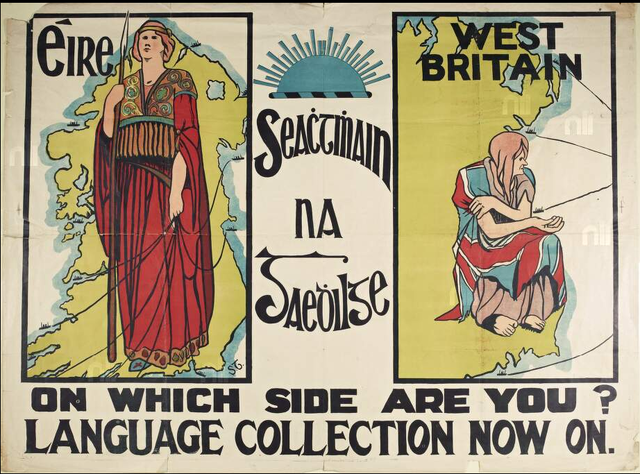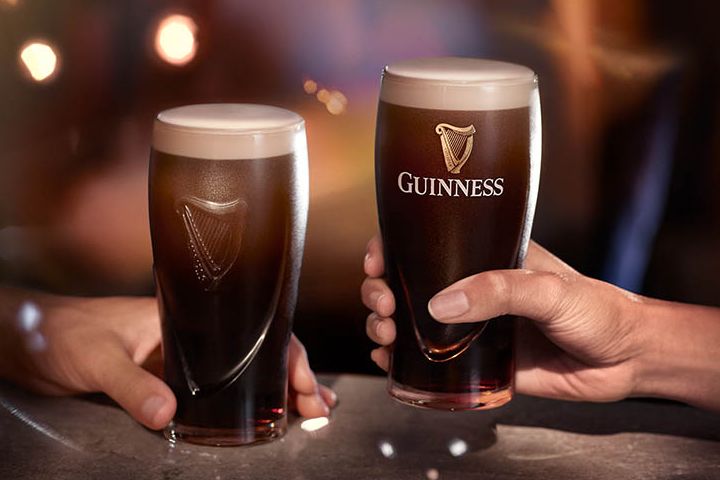Summary
This "On the Éire" episode covers Irish National Identity and what comprises it. We interviewed people on the streets of Dingle, Ireland, to find out "what really makes you Irish." This episode was created by our lovely cast: Arjun Bhatkhande, Connor Channell, Vicky Jiang, Zoe Ngov-Nordvall, and Sunny Orleans.
PODCAST TRANSCRIPT:
Irish Colorguard: Now, if ye could please rise, and remove your cap, for the Irish National Anthem…
[Irish National Anthem, metal cover]
Connor: Hey, everyone. Welcome to “On the Éire.” I’m Connor
Zoe: I’m Zoe
Arjun: I’m Arjun.
Sunny: I’m Sunny.
Vicky: And I’m Vicky. We’ve been studying in Dingle, County Kerry, for the past 6 weeks.
Zoe: And during our time in Ireland, we’ve been curious about what it really means to be Irish. We all know the Irish stereotypes: the Guinness, the luck of the Irish, the fighting…
Connor: But that can’t be what it really means to be Irish. It has to be something about the craic, the music, or Catholicism.
Zoe: Who the hell knows?
Vicky: What’s deep in the heart of the Irish is not a single note; it’s a complex chord. We’ve scoured the internet, and neither academics nor politicians, and certainly not the British, could figure out what it means to be Irish.
Connor: So, we asked the last people you would ever think to ask: Irish people on the streets of Dingle.
Leah: The Irish music, it’s such a culture, it’s such a way to meet people in the bars. The craic is mighty.
Lenka: Definitely the Irish humor. It can be dry, sarcastic, self-depreciating… Even when conversation gets heavy, there is always that one person that would make a joke.
Horse Girl: It means to learn how to horse ride and vape.
Arjun: Well, that last one can’t be right. We thought it would have to be something to do with Catholicism.
John Haslin: I’m a Catholic.
Arjun: Thank God.
Sunny: Oi! Don’t take the Lord’s name in vain!
John Haslin: I don’t think there’s really much of a difference between Catholicism and Protestanianism.
Hamish: Catholicism and Protestantism.
John Haslin: Yeah.
Sunny: Of course, the younger generation would think so; religion around the world is on the decline. So we asked a local historian who has lived and worked in Dingle nearly his entire life.
Michael: My name is Michael O’Colin. I am from Dingle. I am fifty-nine years of age.
Arjun: So, Michael, what’s the word on the Word of God?
Michael: The country’s much more secular now. We had uh, 2015, we had the same sex marriage referendum in Ireland. It passes by two-thirds majority. And the church had voted strongly against that. So yes, it’s having a huge impact in the country. I saw a report recently, and as far as I remember, it said sixteen percent of Irish people attend church on a regular basis.
Sunny: So it’s not being Catholic. Apparently, young Irish people are hardly even going to church anymore.
Arjun: Even after all Saint Patrick did for them?
Sunny: Not all Irish traditions are fading; some are making a comeback. In 2022, almost 1.9 million people stated they could speak Irish, a six percent increase. Here in Dingle, there is a summer Irish language immersion program that’s kind of a rite of passage.
Hamish: I’m just here to learn Irish and about my heritage and stuff.
John Haslin: also here to learn some Irish and shift some women.
Hamish: Shifting is basically like tongue kissing, and you know, like average teenage activities.
Arjun: Sunny tried to give them tips on how to do so. They could tell he was inexperienced.
Hamish: The British Occupation of Ireland: I’m big into that ’cause I’m a hundred percent anti-treaty and I really support like, anti-treaty movements such as Kneecap and stuff.
Sunny: “Kneecap” is a controversial Irish band who’s been advocating for Irish reunification. I think Michael mentioned them too, right?
Michael: Kneecap, whether you agree with them or not, have tapped into something that is like the voice of the downtrodden over the last hundred years, and now they’re finally getting a kind of an upper hand, and they’re making the most of it…
[Kneecap: “H.O.O.D”]
Arjun: We heard that a few other places, didn’t we?
Sunny: Yeah, Irish identity really seems to have developed in opposition to the British.
John Haslin: I’m just proud of our ancestors, what they’ve done. You know, rebelling against the English.
Leah: My grandfather and granddad, my dad’s parents, they were quite involved in the IRA, like I think my grandmother, she smuggled a lot of weapons and, like, notes into jails and stuff.
Thomas: I suppose sort of solidarity with other people who’ve experienced similar things to our country’s history, you know? I would definitely feel more obligated to look at the world through the lens of oppressed people and try to understand what it’s like having your country occupied for as long as we did.
Arjun: Reviving the Irish language seems like it’s a big part of that resistance.
Hamish: I think it’s like a part of our culture, and the British very much took it away. They ended up somewhat erasing the Irish language from our culture and history. And now they’re bringing back Irish culture and our Irish language. It’s our native language, like it’s our native tongue, and it’s a beautiful language.
Leah: The Irish language is such an amazing key tool to have. I’m so proud to speak it. And it used to be a dying-out language, but it’s not anymore, which is absolutely amazing.
Thomas: Both my parents are from England, but I’m born and raised here. I feel very attached to my nationality. Even though they wouldn’t know who I am here, they still accept me as soon as I speak Irish to them. We instantly have that connection.
Arjun: Speaking Irish seems to be very central to the culture of Ireland… but we did only interview people from Dingle.
Arjun: This means that speaking Irish will be a lot more important to people here than in other places in Ireland.
Michael: Belfast is… speaking the language up there is almost a political act. The majority of Irish people can feel one hundred percent Irish without ever speaking or understanding a word of the language.
Vicky: While many people said language made them Irish, for Seán Pól O’Connor, it’s his deep ties to the land itself over generations.
Seán Pól: One of the deep connections that I have to Ireland is that I own a farm. This farm was inherited from my father, who inherited it from his father. And I feel huge connection when I go into a field and I touch the soil, touch the grass; I get goosebumps when I do that. This land is mine; my forefathers fought for this land. And I have a sense of responsibility to hand it over to the next generation.
Zoe: For his wife, Lenka, who immigrated from Slovakia, national identity can be complex. She appreciates the gentleness in the way people here speak, but also sometimes misses the directness of her original homeland.
Lenka: I’ve been here since I was nineteen, and I’ve lived here for nearly two decades. So I think I’ve adapted very well to Irish humor, Irish traditions, the Irish ways of doing things and thinking, and it became part of me. So, I feel that these two identities rather coexist within me.
Connor: Whether their families have lived here for hundreds of years or they’re a first-generation immigrant, one thing remained true for everyone we spoke to: they were all undeniably proud to be Irish.
Vicky: From the humor, the music, the language, to the rolling green hills, they all took pride in living on this beautiful land. Maybe the Irish really are lucky after all.
[Irish National Anthem, metal cover]
Arjun: Thank you for listening. This has been, Arjun
Connor: Connor
Sunny: Sunny
Vicky: Vicky
Zoe: And Zoe. You’ve been listening to “On the Éire.” Slán!
Image Sources:
– https://www.amazon.co.uk/Irish-Family-Names-Herology-Shields/dp/0957544502
– https://www.google.com/url?sa=i&url=https%3A%2F%2Fcommons.wikimedia.org%2Fwiki%2FFile%3A1913_Seachtain_na_Gaeilge_poster.jpg&psig=AOvVaw0kCKQLLAxi6KctKofsT-0T&ust=1753545141873000&source=images&cd=vfe&opi=89978449&ved=0CBUQjRxqFwoTCJiwruyu2I4DFQAAAAAdAAAAABAE
– https://www.google.com/url?sa=i&url=https%3A%2F%2Fopen.spotify.com%2Fartist%2F1ZVACPeq7ccGCoUXwtafUU&psig=AOvVaw2s1D5fdYM1bnRw8TZx8sRn&ust=1753545165237000&source=images&cd=vfe&opi=89978449&ved=0CBgQjhxqFwoTCPjrwveu2I4DFQAAAAAdAAAAABAE
– https://www.google.com/url?sa=i&url=https%3A%2F%2Fwww.catholicworldreport.com%2F2017%2F03%2F17%2Fthe-order-of-irish-catholics-you-probably-havent-heard-of%2F&psig=AOvVaw35w5zEWxk471ZDEOP9mW2T&ust=1753545198316000&source=images&cd=vfe&opi=89978449&ved=0CBgQjhxqFwoTCPDm3Yav2I4DFQAAAAAdAAAAABAE
Audio Sources:
– Assorted Interviews
– Assorted YouTube videos, converted to MP3 format. Including…
^ https://youtu.be/ecZjzrbIbGk
^ https://www.youtube.com/watch?v=uExQKlhx5ms
^ https://www.youtube.com/watch?v=xHEHcE6_TlQ
^ https://www.youtube.com/watch?v=TvoynCy_mJU
^ https://www.youtube.com/watch?v=5c4x9M3v-ug
^ https://www.youtube.com/watch?v=gUS2WFpKAWs
^ https://www.youtube.com/watch?v=h1J_DVutL-w



On the Éire” felt really genuine and fun to listen to. The mix of humor, history, and personal stories gave it a lot of heart. I especially loved the parts about the Irish language and how it’s tied to resistance and identity—those interviews were powerful. The hosts had great chemistry, and their personalities made the whole thing feel natural and engaging. One thing that could be improved is the audio balance; sometimes the music overpowered the voices, like during Michael’s bit on secularism and Kneecap. Also, a few transitions between segments felt a little rushed. But overall, it was such a thoughtful and creative take on what it means to be Irish, and you can tell a lot of care went into making it.
I loved the writing for “On the Éire,” the use of humor to keep listeners engaged was impressive. I think using more music to make the listener feel more immersed might be a good idea. At 1:31, the audio from your interview with Keon has a lot of wind in the background. Maybe try editing the wind sound out so that we can hear Keon a little better. Overall, your podcast is really good. My favorite part was your section on Kneecap.